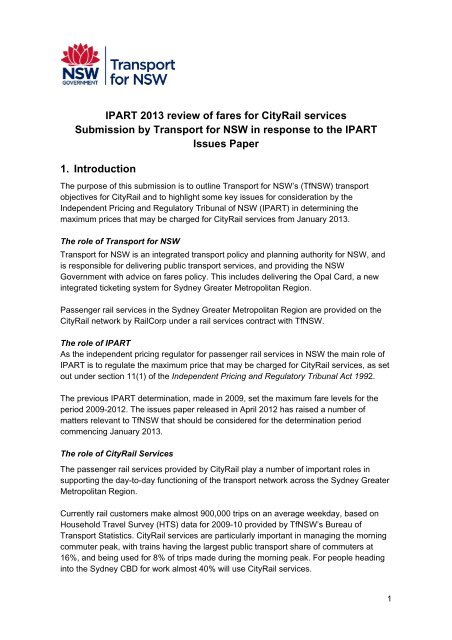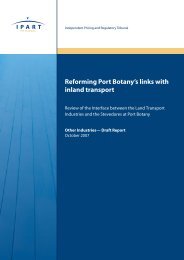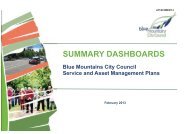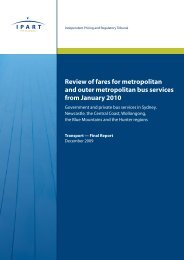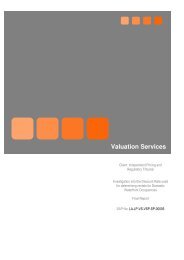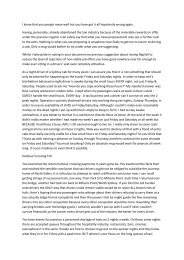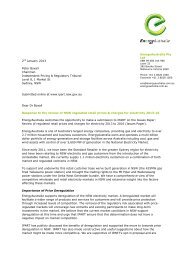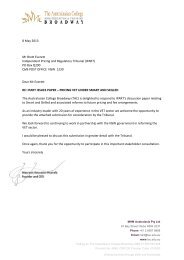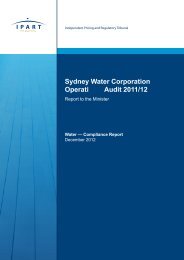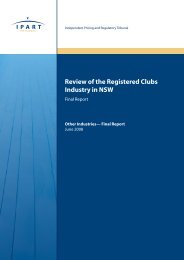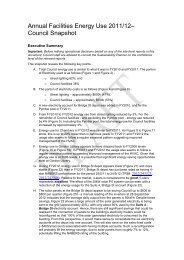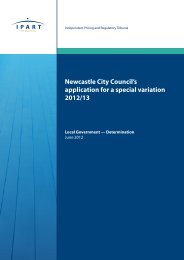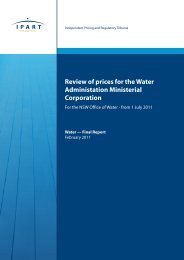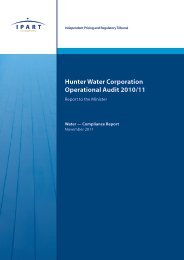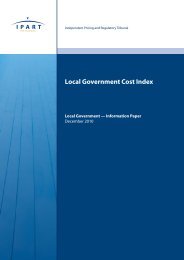Transport for NSW - A. Murray - IPART - NSW Government
Transport for NSW - A. Murray - IPART - NSW Government
Transport for NSW - A. Murray - IPART - NSW Government
You also want an ePaper? Increase the reach of your titles
YUMPU automatically turns print PDFs into web optimized ePapers that Google loves.
<strong>IPART</strong> 2013 review of fares <strong>for</strong> CityRail services<br />
Submission by <strong>Transport</strong> <strong>for</strong> <strong>NSW</strong> in response to the <strong>IPART</strong><br />
Issues Paper<br />
1. Introduction<br />
The purpose of this submission is to outline <strong>Transport</strong> <strong>for</strong> <strong>NSW</strong>’s (Tf<strong>NSW</strong>) transport<br />
objectives <strong>for</strong> CityRail and to highlight some key issues <strong>for</strong> consideration by the<br />
Independent Pricing and Regulatory Tribunal of <strong>NSW</strong> (<strong>IPART</strong>) in determining the<br />
maximum prices that may be charged <strong>for</strong> CityRail services from January 2013.<br />
The role of <strong>Transport</strong> <strong>for</strong> <strong>NSW</strong><br />
<strong>Transport</strong> <strong>for</strong> <strong>NSW</strong> is an integrated transport policy and planning authority <strong>for</strong> <strong>NSW</strong>, and<br />
is responsible <strong>for</strong> delivering public transport services, and providing the <strong>NSW</strong><br />
<strong>Government</strong> with advice on fares policy. This includes delivering the Opal Card, a new<br />
integrated ticketing system <strong>for</strong> Sydney Greater Metropolitan Region.<br />
Passenger rail services in the Sydney Greater Metropolitan Region are provided on the<br />
CityRail network by RailCorp under a rail services contract with Tf<strong>NSW</strong>.<br />
The role of <strong>IPART</strong><br />
As the independent pricing regulator <strong>for</strong> passenger rail services in <strong>NSW</strong> the main role of<br />
<strong>IPART</strong> is to regulate the maximum price that may be charged <strong>for</strong> CityRail services, as set<br />
out under section 11(1) of the Independent Pricing and Regulatory Tribunal Act 1992.<br />
The previous <strong>IPART</strong> determination, made in 2009, set the maximum fare levels <strong>for</strong> the<br />
period 2009-2012. The issues paper released in April 2012 has raised a number of<br />
matters relevant to Tf<strong>NSW</strong> that should be considered <strong>for</strong> the determination period<br />
commencing January 2013.<br />
The role of CityRail Services<br />
The passenger rail services provided by CityRail play a number of important roles in<br />
supporting the day-to-day functioning of the transport network across the Sydney Greater<br />
Metropolitan Region.<br />
Currently rail customers make almost 900,000 trips on an average weekday, based on<br />
Household Travel Survey (HTS) data <strong>for</strong> 2009-10 provided by Tf<strong>NSW</strong>’s Bureau of<br />
<strong>Transport</strong> Statistics. CityRail services are particularly important in managing the morning<br />
commuter peak, with trains having the largest public transport share of commuters at<br />
16%, and being used <strong>for</strong> 8% of trips made during the morning peak. For people heading<br />
into the Sydney CBD <strong>for</strong> work almost 40% will use CityRail services.<br />
1
Key concerns <strong>for</strong> CityRail customers are the quality of the services provided, including<br />
frequency, reliability and safety. A November 2011 passenger satisfaction survey<br />
conducted by Tf<strong>NSW</strong>’s Bureau of <strong>Transport</strong> Statistics recorded an overall satisfaction<br />
rating of 81 percent.<br />
It should also be noted that the benefits of CityRail services extend beyond just rail<br />
customers. In the 2009-12 fare determination <strong>IPART</strong> estimated that the externality benefit<br />
to society provided by CityRail services was $1.73 billion, mostly in avoided road<br />
congestion costs.<br />
2. Policy parameters – the <strong>NSW</strong> <strong>Government</strong>’s transport goals<br />
The <strong>NSW</strong> <strong>Government</strong> has made it clear that the customer must be at the centre of<br />
Tf<strong>NSW</strong> decision making, and has outlined a clear pathway to fix transport in <strong>NSW</strong> <strong>for</strong><br />
customers and the wider community.<br />
In setting out the <strong>NSW</strong> 2021 10-year plan, the <strong>NSW</strong> <strong>Government</strong> identified three goals <strong>for</strong><br />
transport services:<br />
1. reducing travel times,<br />
2. growing patronage on public transport by making it a more attractive<br />
choice, and<br />
3. improving the customer experience.<br />
Long term transport challenges are also being addressed through the development of the<br />
<strong>NSW</strong> Long Term <strong>Transport</strong> Master Plan (LTTMP). The Draft LTTMP will outline key<br />
transport issues, challenges and opportunities over the next 20 years, and is expected to<br />
be released <strong>for</strong> further public feedback in mid 2012.<br />
The <strong>NSW</strong> <strong>Government</strong> is delivering short-term service improvements and major longterm<br />
infrastructure projects identified in both of these plans through a number of<br />
initiatives.<br />
Commencement of the North West Rail Link<br />
The <strong>NSW</strong> <strong>Government</strong> has committed $314 million in 2011-12 to commence work on<br />
delivering the North West Rail Link. The project extends a heavy rail line 23km from<br />
Epping to Rouse Hill, and at a cost of between $7.5 and $8.5 billion it is expected to be<br />
the biggest transport infrastructure project in <strong>NSW</strong> since the Sydney Harbour Bridge.<br />
When completed, more than 29 million customer trips are expected on the North West<br />
Rail Link within five years of opening.<br />
Completion of the South-West Rail Link<br />
Completing the South West Rail Link is a priority <strong>for</strong> the <strong>NSW</strong> <strong>Government</strong>, and in late<br />
2011 more than $80 million worth of major tenders were awarded <strong>for</strong> works that will<br />
support the operation of the South West Rail Link. The $2.1 billion South West Rail Link<br />
involves construction of a new 11km twin-track passenger rail line connecting Glenfield to<br />
Leppington via Edmondson Park, with new stations and commuter parking at Edmondson<br />
Park and Leppington; and a major upgrade of Glenfield Station and rail-bus interchange.<br />
2
Commuters will progressively benefit from the works at Glenfield with the new Station and<br />
northern rail junction to be fully operational in 2014. Services will commence on the new<br />
line to Leppington in 2016.<br />
Delivering new trains<br />
To deliver real service improvements to customers on the CityRail network the <strong>NSW</strong><br />
<strong>Government</strong> is ensuring that new trains are being delivered to replace aging rolling stock.<br />
An additional 15 new 4-car Oscar trains had entered service by February 2012, and in the<br />
same month the <strong>Government</strong> also announced that it will invest a further $175 million to<br />
ensure that 78 new Waratah trains are successfully delivered <strong>for</strong> use by CityRail<br />
customers. The proportion of the CityRail fleet that is less than 10 years old rose from<br />
10% in 2007 to 20% in 2011.<br />
As of April 2012, 8 Waratah trains were available <strong>for</strong> passenger services on the CityRail<br />
network, and it is expected that over 20 new Waratah trains will be available <strong>for</strong><br />
passenger services by the end of 2012. Additional Oscar trains are expected to be<br />
delivered by mid 2013 and the remaining Waratah trains are expected to be delivered by<br />
the end of 2016.<br />
Improvements in on-time running<br />
The proportion of CityRail services that have recorded on-time running (OTR) in peak<br />
periods has risen to 94.6% in 2010-11 exceeding the <strong>NSW</strong> 2021 target of 92%.<br />
Opal Card<br />
The Opal Card and electronic ticketing system will be rolled out on CityRail services<br />
during 2013-14. Opal will be a pay-as-you go system which will automatically deduct the<br />
correct fare from stored value on a customer’s Opal Card. The system is being designed<br />
so that passengers do not have to decide which ticket or tickets that they need to buy<br />
be<strong>for</strong>e they travel. Instead, they will be able to travel across the public transport network<br />
using one card and, regardless of whether they are using a bus, train or ferry – or where<br />
their journey starts and finishes – the Opal Card system will work out the fare <strong>for</strong> their trip<br />
combination.<br />
The <strong>Government</strong> will make further announcements about how the Opal Card will operate<br />
be<strong>for</strong>e the roll out commences in late 2012.<br />
3
Fixing the Trains<br />
Beyond these initiatives to improve services, the <strong>NSW</strong> <strong>Government</strong> has initiated the<br />
Fixing the Trains program in order to improve <strong>NSW</strong> passenger rail services. RailCorp<br />
currently costs $10 million per day to run, and costs are rising three times as fast as the<br />
number of passenger journeys.<br />
It is proposed that Fixing the Trains will shape how metropolitan, regional and intercity<br />
services are provided across the CityRail network. The initiative includes:<br />
• the restructure of RailCorp and the creation of two new specialist organisations to<br />
service the different needs of Sydney and intercity/regional train customers,<br />
• reduction in the number of middle management positions, and<br />
• creating a specialist cleaning unit to target graffiti and rubbish on trains and stations.<br />
As noted by <strong>IPART</strong> in the Issues Paper, the actual cost of providing CityRail services<br />
over the last 3 to 4 years has been greater than the levels expected in the 2009 fare<br />
determination. Through the Fixing the Trains program, the <strong>NSW</strong> <strong>Government</strong> looks<br />
<strong>for</strong>ward to continuing to deliver service improvements across each of these areas as well<br />
as improving how efficiently CityRail services are provided.<br />
Additionally, RailCorp has an ongoing program of efficiency improvements. The scope of<br />
these efficiency improvements are rolling stock and infrastructure maintenance, station<br />
staffing, cleaning, train crewing and support functions.<br />
<strong>Transport</strong> Access Program<br />
As part of the <strong>Government</strong>’s plan to put the customer at the centre of transport decision<br />
making, the <strong>NSW</strong> <strong>Government</strong> announced in April 2012 that the <strong>Transport</strong> Access<br />
Program will provide $100 million to deliver accessible, modern, secure and integrated<br />
transport infrastructure where it is needed most.<br />
This includes more than $82 million of works on a brand new station at Flinders in the<br />
Illawarra, a major upgrade at Cardiff Station in the Hunter, upgraded interchanges at<br />
Fairfield and Sutherland, an upgraded ferry wharf at Balmain.<br />
The <strong>NSW</strong> <strong>Government</strong> has also committed $170 million to build nine new commuter<br />
carparks, including some with new interchanges, at Granville, Canley Vale, Gordon,<br />
Sutherland, Lindfield, Kiama, Moss Vale, Oak Flats and Padstow train stations.<br />
3. Considerations <strong>for</strong> the 2013 CityRail fare review<br />
The <strong>IPART</strong> Issues Paper has raised a number of matters <strong>for</strong> which Tf<strong>NSW</strong> provides<br />
specific responses below. As a general point, however, Tf<strong>NSW</strong> considers that <strong>IPART</strong><br />
should be consistent in its approach to setting maximum fares <strong>for</strong> services in the Sydney<br />
Greater Metropolitan Region.<br />
However, setting fares below the regulated maximum prices determined by <strong>IPART</strong> should<br />
be decisions of policy <strong>for</strong> <strong>Government</strong> given that, like all public transport services,<br />
CityRail services are highly subsidised and Tf<strong>NSW</strong> considers that it is appropriate <strong>for</strong><br />
<strong>Government</strong> to determine levels of subsidy, as a matter of policy, taking into account a<br />
4
number of initiatives including the transition to Opal card and the timing of re<strong>for</strong>ms to<br />
achieve cost efficiencies.<br />
Determining efficient costs<br />
Tf<strong>NSW</strong> notes the proposal to use the proportionate approach based on indexing<br />
estimates of the efficient costs and external benefits from the 2009-12 determination <strong>for</strong><br />
the 2013 determination.<br />
What contribution to the recovery of efficient costs should customers make?<br />
Over recent years, <strong>IPART</strong>’s approach to public transport fare determinations has been to<br />
establish the efficient costs of the services and the externality benefits – that is, the<br />
benefits that the community as a whole receives from the delivery of the services, as<br />
opposed to the benefits that accrue to individual rail customers – to determine the<br />
contribution taxpayers and passengers should make to cost recovery.<br />
In <strong>IPART</strong>’s 2009-2012 fare determination the contribution that should be made by<br />
customers was estimated at 28.5% of the efficient costs of CityRail services. <strong>IPART</strong> has<br />
determined that <strong>Government</strong> (on behalf of the broader community) should fund the<br />
estimated externality benefits a service delivers. Rail customers should not pay more<br />
than the difference.<br />
Tf<strong>NSW</strong> supports this approach to estimating the appropriate fare box cost recovery<br />
target, noting the <strong>IPART</strong> conclusion that CityRail’s actual costs have been greater than<br />
the levels considered efficient over the period 2009-10 to 2011-12.<br />
Approach to setting maximum fares<br />
Opal Card<br />
Tf<strong>NSW</strong> notes that there will be changes to how customers use and pay <strong>for</strong> public<br />
transport over the next few years.<br />
Methodology<br />
As noted above the Opal Card will operate differently from the current, magnetic stripe<br />
ticket products which must be purchased in advance, based on the customer’s<br />
expectations of how they will travel. Instead, customers will have the option of travelling<br />
across the network and the system will calculate the correct fare, including any discounts<br />
that will apply (such as frequency discounts to reward regular customers).<br />
This may require consideration of alternative approaches to setting fares. As noted<br />
previously, the <strong>Government</strong> will make further announcements about how the Opal Card<br />
will operate be<strong>for</strong>e the roll out of the system commences.<br />
Length of determination<br />
Noting that the introduction of Opal may require different approaches to fare setting – and<br />
that the determination <strong>for</strong> metropolitan and outer-metropolitan bus services expires at the<br />
end of 2013, Tf<strong>NSW</strong> supports annual determinations <strong>for</strong> CityRail and Sydney Ferries in<br />
2013.<br />
5
This will provide <strong>IPART</strong> with the flexibility to alter its fare setting approach during the Opal<br />
transition period to take into account ongoing developments, including <strong>Government</strong> policy<br />
decisions.<br />
Maximum fare increases<br />
The approach taken by <strong>IPART</strong> in setting maximum fare increases <strong>for</strong> CityRail services<br />
should also by guided by any Opal policy decisions made by the <strong>NSW</strong> <strong>Government</strong>.<br />
The <strong>NSW</strong> <strong>Government</strong> is expected to make further announcements this year about the<br />
introduction of Opal, and these should also be considered by <strong>IPART</strong> in making a<br />
determination.<br />
6


